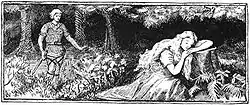Skáldskaparmál
Skáldskaparmál (Old Norse: 'The Language of Poetry';[1] c. 50,000 words; Old Norse pronunciation: [ˈskaldskaparˌmɒːl]; Icelandic pronunciation: [ˈskaultskaparˌmauːl]) is the second part of Snorri Sturluson's Prose Edda.
It is a dialogue between Ægir, the divine personification of the sea, and Bragi, the god of poetry, in which both Norse mythology and discourse on the nature of poetry are intertwined. The origin of a number of kennings is given; then Bragi delivers a systematic list of kennings for various people, places and things. He then goes on to discuss poetic language in some detail, in particular heiti, the concept of poetical words which are non-periphrastic (like steed for horse), and again systematises these. This in a way forms an early form of poetic thesaurus.
References
- Orchard 1997, p. 149.
Bibliography
- Orchard, Andy (1997). Dictionary of Norse Myth and Legend. Cassell. ISBN 978-0-304-34520-5.
Further reading
- Anthony Faulkes, "The sources of Skáldskaparmál: Snorri’s intellectual background", in: Alois Wolf (ed.), Snorri Sturluson, Volume 51 of ScriptOralia, Gunter Narr Verlag (1993), 59–76.
External links
- Editions
- Sveinbjörn Egilsson (ed.) Edda Snorra Sturlusonar:: eða Gylfaginníng, Skáldskaparmál og Háttatal (1848), 45–143.
- Guðni Jónsson (ed.), Eddukvaeði,Íslendingasagnaútgáfan (1954) (heimskringla.no)
- Anthony Faulkes (ed.), Edda; Skáldskaparmál, 2 volumes: vol. 1: Introduction, Text and Notes, vol. 2: Glossary and Index of Names, London (1998; 2007).
- Translations
| Wikisource has original text related to this article: |
- Rasmus Björn Anderson (trans.) (1872) (germanicmythology.com)
- Arthur Gilchrist Brodeur (trans.) (1916) (germanicmythology.com)
